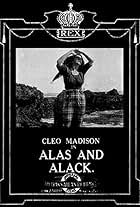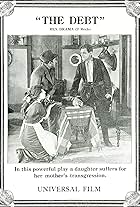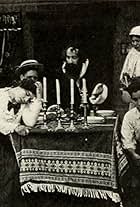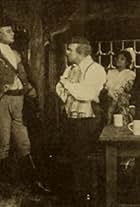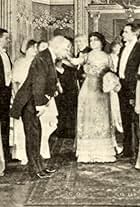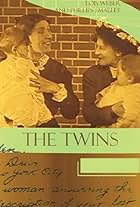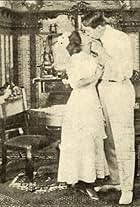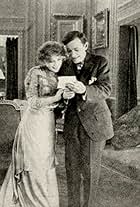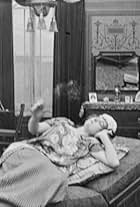Advanced search
- TITLES
- NAMES
- COLLABORATIONS
Search filters
Enter full date
to
or just enter yyyy, or yyyy-mm below
to
to
to
Exclude
Only includes titles with the selected topics
to
In minutes
to
1-50 of 558
- Abandoned by her maidservant in an isolated country house, a mother must protect herself and her baby from an invading tramp while her husband races home in a stolen car to save them.
- Eleanor, who earns her living working with her mother as a laundress, is courted by a bad man who will try to induct her into crime. Surprising finale. One of the few Cleo Madison surviving films.
- A fishwife tells her young daughter a fairy story about a princess imprisoned by a hunchback in a seashell, a story that parallels her own life.
- The story of a two jewel thieves whose lives intersect during the course of their crimes.
- At a big automobile race one of the winning drivers, Tony Jeanette, is given an invitation to a masked ball to take place that evening at the home of the wealthy Mrs. Montague. In haste, he drops the invitation, which is found by F.J. Francis, a society crook, and also read by Meg, another gentile crook. Knowing of the wonderful necklace of Mrs. Montague, they both decide to attend the ball in an effort to steal same, unknown to each other. At the ball Meg is seen masked, watching every chance to get the necklace, but Francis is more clever and gets away with it. The diamond is missed. Two society detectives at the ball follow Francis' cab, which he jumps out of while going at high speed, leaving his cane inside the cab. Meg follows Francis unknown to anyone, and succeeds in getting into his apartments. Francis discovers her and shows her the diamonds, which she tries to get. After she has gone, he misses his watch, which she has cleverly taken to yet even. In the meantime the detectives have gotten up with Francis' cab and discover it is empty, but find his cane with his monogram (F.J.H.) on. They find the jeweler who made the cane, and find from him the club to which Francis belongs. Going there they discover Francis, but are not sure of him, as they only saw him at the ball and he was masked. They ask for a light and cigarette, and see the same monogram on his ring and cigarette case, and arrest him as the thief. Meg hears of his arrest and attends his trial, when he is pronounced guilty. Going to his cell, she offers to help him if she can. He tells her where he has bidden them, and she goes to his apartment, gets the jewels from their hiding place in the wastebasket, and stealing into Mrs. Montague's boudoir, places the jewels where she finds them later, and phones the police of their discovery. Francis is released. He and Meg marry and give up all of their ill-gotten gain to the society of the orphans. The last scene shows them looking at the bank balance of $10.00, but happy in their love and promise of a better life.
- Unaware that they are related, children born to the octoroon (1/16th Black) mistress and a white wife of a white man meet and fall in love.
- ShortThe story opens in the ante-room of the royal bed-chamber. The queen dies. She was the mother of Snow White. A year later the king brings home a wicked queen. Snow White is presented to her stepmother. The queen sees in her magic mirror a message that Snow White will be prettier than she. The king leaves the country for a short period. No sooner is the king gone, than the queen compels a hunter to carry Snow White to the woods and slay her. The hunter weakens and sets Snow White free. He kills a rabbit, and in the blood of the slaughtered animal dips his handkerchief, which he shows to the queen as proof that he has carried out his mission. Snow White sees a cottage in the distance, and goes to it. Finding it apparently vacant, she enters and searches through the rooms, in the fireplace a pot is boiling. The table is spread. The beds are made. She lies on one of the beds and falls asleep. Seven little men are at work in a mine. At the close of the day they stop their labor and march home in military fashion. The leader finds Snow White. He summons his mates and they awaken the sleeper. Snow White agrees to keep house for the little folks. The queen, through her mirror, has learned that the hunter has played her false. The next day she goes in disguise to the hut. She gives Snow White a poisoned comb. Snow White falls unconscious. When the dwarfs return they soon discover the trouble and remove the comb, restoring Snow White. The next day the queen returns. In spite of the warnings of the dwarfs the queen is admitted by Snow White. The queen induces her to eat of a poisoned apple. Snow White falls dead. The dwarfs bemoan the loss of their princess. The queen learns of the death of Snow White. The glass tells her, "Oh, queen, there is none in the land so beautiful as thou." A prince now comes upon the scene. From a hill he sees a strange sight. He dismounts and approaches a casket of glass, surrounded by seven mourning little men. He leans over the casket and kisses the face of the still figure within. Immediately Snow White comes to life. The king and queen are at the head of the court assembling to greet a new prince and his bride. It is the prince and Snow White. The queen is exposed and turned out. The king welcomes his restored daughter and her prince and gives the two his blessing.
- William Ralston, a rich unscrupulous contractor, has in his employ a young foreman by the name of Watson, whose wife, Edith, is a beautiful woman. For years Ralston has been given to wrecking homes, but his advances to Watson's wife have all been repulsed. Fearing that her husband might lose his position, Edith has told him nothing about the advances made to her by Ralston. Reassured by her silence in this respect, Ralston takes advantage of her husband's absence on business and with the help of Ned Murray, a political boss, frames up a criminal charge of stealing the firm's money against the husband, so as to railroad him to prison. This would enable him to win over the wife at his leisure. Watson is arrested and Murray is told by Ralston to fix the jury, so as to make sure of a conviction. Owing to the watchfulness of the "Reformers," none of Murray's trusted "heelers" will take a chance of tampering with the jury. Murray, at his wit's end, picks up a derelict, Jim Hunter, who, in spite of his appearance, strikes him as the man to carry out the dastardly scheme. Hunter agrees to do the dirty work for a sum of money. The day of Watson's trial arrives. The derelict is drawn on the jury, thanks to the betrayal of public trust by the clerk of the court, who is Murray's henchman. Hunter is told to convict Watson. and to influence the jury. He is number "7" of the jury. The government's case against Watson is so strong as to leave no doubts in the minds of the spectators as to the final verdict. Juror number "7" is listless all through the trial until Ralston is called to the stand. In Ralston he recognizes the wrecker of his former home, the betrayer of his wife. His mind is made up. The excitement makes him tremble like a leaf. Murray, who is sitting among the spectators, attributes it all to lack of "dope" and manages by the aid of a court attendant, another henchman, to get a package to Juror No. 7, who recognizes it as "dope." The jury is charged by the court. When they enter the jury room, Hunter, unobserved, takes the "dope" from the package. The jurors' minds are made up to convict the prisoner. The dope brings temporary strength to the derelict. He rises from his seat and asks the jurors to listen to him before they vote. They consent and in a faltering voice he narrates to them his story. The narration of the story saps his strength. He falls exhausted in the chair. The derelict, for a final appeal, staggers to his feet and implores his fellow jurymen to remember his wrecked life and save this innocent man from prison. Each of the jurors votes "not guilty." The jurymen file back into the courtroom. The judge asks for their verdict. The foreman answers "not guilty." Watson and his faithful wife embrace. The foreman demands the court to arrest Balaton and Murray. Great excitement ensues. The derelict's head drops on his breast. The foreman, fearing the worst, lifts up his head and discovers that juror number "7" is dead.
- Betty and Molly, sisters, are employed at the railroad station as waitresses. Molly has been married by her step-father to a brutal drunkard, Steve Moran, while the mother of the two girls is married to Dan Morgan, who is also a slave to drink. A theatrical troupe visits the eating house and Betty meets Burton Howard, a theater magnate. He is taken with her appearance, and giving her his card, invites her to visit him should she ever find herself on Broadway, in New York. Martin Dane, who has just arrived in town to take a job as foreman at the Morrison Steel Works, admires Betty. He saves the girl's stepfather from a drunken brawl and is invited to call that evening. Betty, anticipating another marriage such as her sister's, does not encourage Dane. Molly's husband dies in a drunken stupor, and she, seeing that her sister is about to be forced into conditions like those under which she suffered, plans to use the money she had received from her husband's insurance policy to free her sister. Betty is thus enabled to run away just before she is to be married to Dane. She goes to New York, where she calls on Burton Howard, who finally recognizes her and gives her a minor position in one of his companies. He enables her to rise in her new profession, but Betty soon finds that his interest has strings to it. Meanwhile the brutal husband of Mrs. Morgan has also died, and Martin Dane has taken the poor woman to keep house for him in the cottage he had furnished in anticipation of his marriage to Betty. Molly shows him the letter she has received from Betty, realizing at last Martin's true worth and the mistake she and her sister have made in thinking otherwise. Dane visits the city and locates Hetty's boarding house. Betty has been endeavoring to stave off Howard's advances with the excuse of not having fitting gowns to accompany him to cafés. He has bought her a fine gown and now insists that she spend the evening with him. Dane gains admittance to Betty's room before she arrives home and conceals himself. When she arrives home she is surprised when confronted by the man she promised to marry and later deserted. She at first refuses to return with Dane as his wife, repelled by the sordidness she imagines will follow. Howard calls in his taxi to take her out. He is admitted to Betty's room and the two men come face to face.
- Three cliques of people, each unknown to the other, are making plans at their respective headquarters and their eyes are all turned to a common point. Jack Darrow, operative of a private detective agency, and his aides are planning a crusade against a band of clairvoyant fakirs. The Jeffersons are to give a ball masque, introducing their daughter, Hope, to their social set. It is rumored that she will wear the Pompador diamond necklace recently purchased by her father. In another part of the city Prof. M. Byrd, an alleged clairvoyant, is planning to attend the ball and steal the jewel. Through Crawley, his confederate, Byrd procures an invitation for himself and Lady Mildred, a dupe of his, offers her services in stealing the necklace. Byrd plans to attend the ball disguised as Mephisto. At the proper time Mildred is to bring out the necklace and pass it to a confederate. However, on the evening of the ball there is a second guest disguised as Mephisto, no other than Darrow, the detective. The lights in the ballroom go out. There is a few moments' confusion and when the hall is again illuminated, the diamond necklace is gone. It is soon recovered, however. Darrow is waiting for Byrd in the conservatory and when he arrives he is overpowered and placed under arrest. Mildred's liberation comes swift and completely when she turns back the lapel of her jacket and shows her badge. She is not only Darrow' s assistant but his sweetheart as well.
- Arthur Vaughn, a rising young artist, steps into a cobbler's shop to "save his sole," and sees there a girl, the daughter of the cobbler. The cobbler is an habitual drunkard, and the artist tells the girl to leave the squalor of her surroundings and offers her work in his studio. The girl accepts. One day, the artist paints her as she stands, in her rags. It is pronounced a master work. Another day the girl dons the satins and silks of the models, and bids him paint her in those raiments. His trained eye notes the distinct contrast, and he paints her in fine feathers. The portraits, with their contrast and realism, are masterpieces, and quickly establish the artist's reputation. At an exhibition of the Art League it attracts the attention of the President, who becomes curious to know the model. He meets her, and exhorts her to leave the life she is leading. The girl ponders his advice, sees the truth of it and the fearful trend of her life and asks the artist to marry her. He tells her he cannot. The girl, resolved to return to a life of honor, returns to her miserable home. In her absence, the artist realizes that he really loves the girl, and goes to seek her. He enters in time to frustrate the maddened cobbler from wreaking his drunken vengeance upon the girl for leaving him, and leads her out into that life which through all the years she bad dreamt of.
- Isaac and his faithful wife Rachel deplore that in America their children are forced to work on the Jewish Sabbath. Leah and Sam are not so strict as their parents and the old customs pall about their more American spirits. Sam is employed in a cloak house and secretly loves his employer's daughter, but she refuses to recognize him. Leah is loved by the handsome gentile floorwalker, and despite her father's objections, she marries him. Isaac orders Leah from the house. Later, the daughter of the cloak manufacturer marries an admirer and Sam is invited to the wedding. He drinks and disgraces himself; returning home, is turned out by the heartbroken rabbi. He leaves, telling the old man that he will return when the father celebrates the Christian Christmas. Two years pass. Leah presents herself at her father's door with a baby in her arms. The old Jew refuses to see, but the mother longs to take the girl to her bosom. Julian falls under a street car; his legs are severed at the knees. Leah visits him at the hospital and is grief-stricken. Ten years later the rabbi and his wife are in poor circumstances, though he is as rigid as ever. Leah and Julian have adopted flower-making as a means of livelihood. Without knowing, the family have taken rooms above those of the rabbi. One afternoon their little girl meets the old man in the yard and assists him. An attachment springs up between the child and the old man, and the latter is impressed many times by instances of the kindness of the gentiles towards the Jews in this country. It is this child, on a Christmas night, that finally brings about reconciliation between the girl and the old father.
- Hiti was a little Japanese maid, but her feminine heart was the same as that organ of any other woman in the world, and it played the same tune. Hiti had big black eyes, soft olive hands and a stubborn will. Hiti fell in love. He was only a poor little Jap, but a manly chap. It was just like in your own little town; the more Hiti's parents objected to the fellow, the more determined was Hiti to marry him. Then a wealthy Japanese merchant came a wooing Hiti. Many miles he came, advising Hiti's parents that he was en route to bid for the hand of the enchanting Hiti. The parents were filled with joy, which of course Hiti didn't share. There was a little American girl in Hitl's town, the daughter of a consul or something, and the two girls had long been friends. It was the East's appeal to the Western, and the Western heart's silent response to the East. So Hiti went to the American girl and told her of her great sorrow, and American strategy and Oriental sagacity combined to defeat the logic of the old. It was thought of by we don't know whom; it might have been Hiti, or it might have been Elsie; but at any rate, when the mighty merchant reached the house, he found a very ugly Hiti indeed. Her face was enough to stop a Japanese automatic toy, and the merchant fled. Hiti married the right man. Hiti and Elsie often talk about the stunt that made her sweetheart her husband, and sometimes they laugh so loud that they wake the little Jap baby, who evidences his displeasure at the interruption of his siesta with a very ordinary baby wail.
- The husband is a grouch and continually nagging his wife. A friend who is visiting them, through admiration and sympathy allows himself to become infatuated with her. He tells her of his love for her, but she, true to her husband, commands him to leave the house. Shortly afterwards, the husband becomes so unbearable that she decides to leave him and cast her lot with the other. She leaves her little child with her husband. The other, though he is always kind, proves unfaithful. The child dies. Her maternal love leads her back home. Her husband takes her to the child's grave and leaves her there mourning for her little girl. Presently along comes the grave digger and he almost stumbles over the inanimate form of the poor broken-hearted mother who has expired on the grave of her little one.
- During the American Revolution, an innkeeper's daughter learns of a plot to assassinate George Washington while he will be staying at her father's inn.
- By the light of the old, old moon, they are spooning, when their blissful occupation is interrupted by an eavesdropping tramp who sees possibilities of blackmail. A tribute is demanded, and awarded, and the lovers resume the sentimental session. In the way of lovers, the talk turns to marriage. They discuss her father's stubborn opposition, the chance of making him consent to their marriage. They determine to foil the old gentleman and marry in spite of him. The lovers decide to elope, in no less startling a manner than by an aeroplane, which they do, only to be seen by the irate parent, who pursues the car of the air in his automobile. Straight, fast, steadily, the aeroplane proceeds on its way to a minister and gets there long enough before the arrival of the father to receive the marital blessing, and afford the old gent a healthy excuse for his wrath. A year or so goes by and we see the young husband phoning the doctor that, well, we know what it is about when we glimpse at the medico's face. The doctor at once gets into his car and is off. We see his car racing along and over him a stork flying in the same direction. Then we see the baby, a bouncing baby it is, and just as the father is portraying his happiness with another. There is consternation on the face of the father, but genuine amusement on the faces of all who witness it.
- Pretty Ann, and Joe, the hostler, one day chance to meet. Strong is Joe, and simple, and Ann is shy and sweet. As man and maid have done before, they love, and marry, too. And live happy ever after? Ah, this tale is new to you! Yes, the tale is drear, prosaic; and so poetry won't do. A baby boy comes to bless the union. Joe is working in the stables when they tell him of his joy: his heart is gay and happy, and he tells the horses so. Then, it might be the angels were jealous of such mortal happiness; it might be the devil, seeing the stage so set, entered to play the leading role. The tempter comes to the woman. He is a gentleman, suave, polished, charming, a man of manners; and Ann, knowing not the manners of men, hears and heeds and falls as the angels fall from heaven, another Eve heeding the serpent's call, facing a morn of desired delight, and the twilight of despair. One night Joe comes home with a happy cry of "Wife!" But the only answer is the whisper of desolation, the ghostly voice of ghastly vice! He reads the note she left him, and, Joe don't know much about God, excepting what he feels, don't know much about anything but bosses, but he asks the Lord to pardon and protect the weak woman he loved. Like a frail blossom lacking sunshine, the motherless baby droops and dies. Joe goes his way, making no complaint, 'ceptin' what he tells his bosses, 'ceptin' what he tells his God! Far away in mighty London, the woman rises into fame. Through her lover's influence and wealth, she becomes a noted actress. Her beauty wins men's homage, and she prospers in her shame. Then the day of reckoning! Time plays no favorites: the immutable law of the years takes its course; youth flies, her beauty vanishes, her charm withers: and the pretty toy, grown useless, is flung aside, as of old. The wedded morn and roses, and the widowed night, and mourning; light and life today; dark and death tomorrow; the errand of folly, and the wage of sin, from Adam to eternity! In a far-off country town, youth and strength gone, his soul seared by the sad sorrow of woman's sin, Joe reads in a newspaper how a once-famous actress, alone and in poverty, is dying. The fickle world has forgotten her fame: the fickle worshipers of wanton beauty have forgotten her very name. But Joe has forgotten only her sin and shame; only Joe remembers; only Joe is true. He comes to her and tells her he forgives her, tells her he loves her for what might have been, for the soul he would meet again in the Far Away, in the Beyond, across the vale. Held in his arms, the eyes that had seen sin look into the cleansing tears in his, and close in death! On the stone over her grave Joe wrote one word, the honored name of "Wife." A blossom we fain would pluck today from the flowers above her dust; a blossom as pure as love that lasts, a blossom sweet as the peace and purity we hope Ann found in the Distant Land.
- The baby daughter of Mrs. Norton, a widowed seamstress, dies. The sorrow-stricken mother gazes at the empty cradle and decides to replace the departed soul with an orphan child upon whom she can lavish the love, the rightful object of which the Great Giver and Taker has taken from her. She goes to the orphanage and asks to be given a baby girl, and is given one of the twin baby sisters. Richard Golden, a wealthy shirtwaist manufacturer, has an only son, a little boy, who yearns for a sister and continually begs his father to bring him a little sister to be a playmate to him, and the father, to satisfy the child's persistent pleading, goes to the orphan home and brings home the other little twin sister. Years roll by and both girls have grown to young womanhood in their different stations in life. Jack Golden, now grown to manhood, and knowing that the girl is only a foster sister, asks her to become his wife. The girl consents only to end his stubborn importunings, but she really loves a chauffeur, with whom she plans to elope. The girl and the chauffeur get away in an automobile, but a mishap occurs which changes the destinies of all the characters in the incident. The car goes over a cliff and the chauffeur is killed while the girl is taken unconscious to a hospital, where being nothing on her person to disclose her identity. In the meantime, Lucy, now a seamstress and earning a livelihood for both her foster mother and herself, has been delegated by her union to call upon the Board of Directors of the shirtwaist organization to petition for shorter hours and higher wages. Mr. Golden and his son finding her there, the close resemblance to their missing one, makes them believe that she is none other. The surprised girl tells her story, but they conclude she must have lost her reason. They follow her to the home of poor old Mrs. Norton, from whom they learn that this girl is only a sister to the one whom they seek. After many fruitless searches, Mr. Golden advertises for his lost daughter and is informed by the house physician of the hospital that she is in his care. Mr. Golden hastens there only to find that she has expired. To fill the vacancy in their heart and home they offer a home of luxury to the poor twin and her aged foster mother, which offer is accepted and the spirit of the departed girl brings to her poverty-stricken the joys and ease she had enjoyed while on earth.
- Little Sherlock Holmes, Jr., reads the doughty doings of his hero-god, and at once determines to become a detective himself. Providence at once favors him by giving him a mystery to solve. His father has noticed that in some weird, unaccountable fashion the whiskey in the decanter is ever vanishing, and father swears he drink it as fast as all that. So Sherlock Holmes, Jr. assigns himself the task of discovering who tampers with his father's soothing beverage. Concealed behind a table, he sees Bridget, the cook, come in and at once proceed to get on the outside of a man's size pull on the flask. At once the embryo detective makes his report to his father, with the astounding solution of the mystery. The father decides to use Dr. Brown's Sure Cure for the Liquor Habit on the cook, and obtains a bottle of the fluid. This he puts in the room near the whiskey, intending to pour some in the bottle a little later. Sherlock Holmes, Jr., discovers the bottle and follows the 'Do it Now' maxim. There are friends visiting the house at the time, who are sitting on the lawn with his parents, awaiting tea, which the maid is going to bring them. Sherlock Holmes, Jr. pours a goodly amount of the fluid into the tea. One of the results of taking the liquid is falling into a deep slumber, and in a few moments the host, the hostess, and the guests are fast asleep. Then happen's along Bridget's beau, the policeman, for whose particular benefit Bridget essays to go inside and procure a glass of 'buttermilk.' After imbibing, the policeman forgets all about everything except that he is awful drowsy, and the next thing, he, too, is asleep. It must have been contagious - or could Bridget not have forgotten herself? - but at any rate, she, too, wanders off into the Land of Nod. Then Sherlock dons the policeman's clothes and club, and marches through the house, monarch of all he surveys. At this opportune moment, two burglars arrive at the scene, and seeking the sleepers, think they have been transferred to Burglar's Paradise. They sneak upstairs, fill their bags with silverware and then fall for the whiskey on the table, little Sherlock watching eagerly. At last they get themselves off, followed by the creator of all the mischief, but they have not gone far when they are overcome by the liquor cure and fall in their tracks to sleep. Little Sherlock now takes the manacles from the policeman's coat pocket, and ties both legs of the burglars together. In due time the household awakes, they seek the boy, and eventually find him covering the two burglars, prisoners of Sherlock Holmes, Jr.
- Sitting by the hearth, the old sweethearts see in the flames the happy record of their youth. How he met and loved her; how his father refused to consent to their marriage, and her plan to win his reluctant approval. She remembers how she went to the farm, with the bogus plea of being ill and needing country air. She recalls all the wiles and guiles she exerted in her effort to win his good graces. And now they laugh, she remembers, it is amusing now that they have children of their own, though it was a mighty serious thing then, how his father fell in love with her himself, and proposed! She asked him to give her a little time, and she came to the city and told her sweetheart all about it. They visited a minister, and the son no longer feared his father's rivalry. Then they boldly returned to the farm, and told her other lover all about it. It was a serious surprise to the father, but it was even more humorous, so he took his sweetheart daughter-in-law to his heart. They remember it all, and their minds are busy with the happy recollections when their children rush in upon them. There is a bashful boy with their daughter, and the story that started fifty years ago is continued in the romance of the newer lovers.
- When the boy and girl are confronted by the sordid conditions of poverty, the girl, rather than give way to despair, seeks work, while the boy readily gives way to drink and crime. The sister finds employment with Corbin and Son, brokers. The brother goes to jail. Corbin, the senior member of the firm, is the type of man in whose company no girl can be safe from insult. The son, who is the real brains of the firm, is a young man of honor. A breach follows between father and son when the former attempts to make advances to the girl. Later, the son's name is dropped from the firm. Several years pass and we find the younger Corbin and his former stenographer married and happy. Corbin senior, constantly seeks to spoil the success of his son. Having finished his jail sentence, the brother of the girl returns to his old ways: he enters Corbin Sr.'s home to steal. He is captured and given the alternative of going back to jail by Corbin or accepting $1,000 and securing certain information from the son's place. The brother consents. In the young broker's home he finds his sister. He would carry out his scheme in spite of this, but the husband enters and under the point of a gun the brother confesses his mission. There is a mutual agreement and the brother returns to the house of Corbin Sr. with papers, the instructions of which, if carried out, will ruin the old man. Corbin takes the tip and after a thrilling scene on the stock market, goes broke, ruined at his own game. In the end he is glad to come to his son and again be a member of the firm of Corbin and Son.
- When Edith, living in the country, learns that her mother must go south for the winter as the only means of saving her life, she writes to her sister that she is coming to the city to look for work. As she leaves, her sweetheart gives her a revolver, with instructions to use it on city fellows who might try to get fresh. In the meantime, her sister Helen is struggling in the city as a stenographer. Her employer. Manning, makes overtures to her and she continues to fight him off. She is crestfallen when she receives Edith's letter, telling of her mother's ill health and of the money necessary to send her away. Manning reads this letter and tempts the girl with a check. She resists and later, in the course of her work, she writes a letter to the effect that a certain option that can be bought for $500 will save the company $80,000. Deceiving Manning with her smiles, she gets the check. Edith has arrived and is waiting in the adjoining room. Helen gives her the money, with instructions to buy the option. Manning overhears and tries to interfere, but Helen holds him at bay with her sister's gun while the latter goes on the errand. When Edith returns she finds Helen in a faint on the floor and Manning about to secure the document when Hull, who sold the option, enters and takes the girls under his protection. A few months finds the two girls with their mother comfortably settled. Helen receives word from Hull that the option has been sold for $10,000 and that Manning has been paid the $500 which had been borrowed.
- Mrs. Van Jessalyn-Smythe and her daughter are annoyed at the prospect unfolded by the receipt of a letter from her married sister, saying that her daughter Jennie has married Bill Simpkins, because they are expecting a distinguished visitor, Lord Brighton, on whom the daughter intends to impose all her feminine charms. However, the boob and his bride arrive. The following evening there is to be a ball in honor of Lord Brighton. The hostess sends a complete set of full evening dress to their apartment. The boob and his bride manage to get into the clothes, but in each case, the shoes are too small. They limp into the ballroom. Mrs. Smythe is disgusted with the boob's awkwardness. When the tight shoes become unbearable, the bride goes into the conservatory, and attempts to take them off. She is seen by Lord Brighton, who immediately runs to her assistance. While he is tugging at her shoe, the boob happens upon the scene. "How dare you make love to my wife," the boob roars, and chases him through the ballroom. He follows the aristocrat until he is well down the driveway, and then returns to relate the joke to his wife. The boob and his wife decide that fine clothes are not for them, and they return back to Spoonville on the first train.
- Andrea Dubois is preparing for her marriage. The hours she spends over her trousseau are long and pleasant. Edmond Rodger, her fiancé, she esteems and honors as a gentleman. Rodger is highly respected by all his friends, yet underneath runs a streak of yellow. Rodger willing coveted and realized Elsie Levine's love, only to betray her. In a touching scene Elsie searches out Rodger, confesses her condition, and urges him to fulfill his promise in marriage. Rodger responds by explaining his coming marriage to Andrea. Elsie returns home to confess the whole affair to her brother Rupert. Rupert determines to avenge his sister's wrong. Departing from the house he makes his way to the club and searches out the guilty man. He meets him in the private ante-room. The curtains are closed, a revolver drawn, there is a report, and when the club members rush in, Rodger lies dead. Rupert has escaped. The news is carried to Rodger's fiancée. It is at this time that she makes the oath of vengeance, which she endeavors for five years to fulfill. The first reel closes with the scene at the bank of the river. Elsie, the betrayed little girl, pauses by the shore. She drops her hat and gazes into the water as the picture fades. At the opening of the second reel Rupert Levine, under the assumed name of Rupert Livingston, is met as an attaché of a foreign legation. For five years he has managed to evade punishment for the killing of his sister's betrayer. About this time he receives an invitation to a reception given in honor of the French Ambassador. Cut to Andrea's home and a page from her diary, which reads: "Five years of search has revealed no trace of Edmond's assassin, but I will find him and hound him to his death." The night of the reception arrives and fate takes a hand. Andrea is in a beautiful ballroom. The host at her side presents her to Rupert, and as the hands clasp and the eyes meet, there is a glance of mutual attraction. The evening is hardly past before these two people, unaware of each other's identity, have experienced the quickening of love. Other meetings follow, and time finds love in the heart of Andrea for Rupert. It is at the time she realizes this that Rupert's identity is revealed to her. The shock of discovery plays havoc with her resolutions, and yet, there is her oath. She knows nothing outside of the fact that Rodger was killed by Rupert, and in turn, she plans an awful revenge. This is to poison herself, under conditions which would point to Rupert as being her murderer. With the sense ever present that something is all wrong, she carries this plan into execution, except for the quick wit of her maid, who substitutes a bottle of water for the poison. When Rupert explains to her that she has sacrificed herself for the man who was untrue to her, and caused his sister's death, she was glad that it had happened as it did. As the story ends, Andrea believes in a higher power than her own and anticipates happier days with the man who is a man in word and deed.
- Old Ben Morrison and his daughter, Jen, an unsophisticated girl, live on an island not far from the mainland. Jasper Crane, middle-aged sensualist of the rougher type, bargains with Jen's father, in hopes of marrying and gaining possession of the girl. Morrison is willing, and explains that she is like her mother, who deserted her home and baby for a city man. Jen, hearing of her father's plan, makes her escape by swimming to the mainland, where she seeks protection from Mrs. Hilton and her daughter, Dorothy, members of a camping party. James Hilton, Dorothy's brother, falls in love with Jen. Kent, a refined sensualist of the party, covets the girl, but finds his plans checked at each turn by James. Knowledge of James' affection for Jen reaches his mother's ears, and she informs her daughter that things are going too far and the strange girl must go. Jen overhears the conversation between Mrs. Hilton and her daughter, and realizes that she is not wanted. Kent, noticing the girl's discomfiture, gives her a sum of money for expense and advises her to call at his office in the city, should she ever want for anything. Alice, Jen's mother, served for a time as the plaything of John Newton, the man with whom she ran away, but when he tired of her she drifted into a vulgar blasé set. Jen unable to secure work in the city, writes to Kent for aid. Kent is engaged to marry Dorothy Hilton and plans to celebrate the closing days of bachelorhood on board his palatial yacht. John Newton, who is just returning from an extended European trip, is also to be in the party. Kent and his cronies plan a surprise for Newton. Knowing his former relations with Alice Morison, they plan to have her as one of the party. At the party Alice is discovered by Newton and strange emotions surge in the breasts of the pair. At the height of the party Kent receives Jen's letter asking for aid and he plans to add to the zest of the party by showing them an unsophisticated girl. He accordingly sends for Jen. She arrives, and Alice recognizes her daughter, although she cannot reveal her true identity her child. Back in the offices of Kent and Hilton, who are partners, news comes of a financial crisis, and James Hilton leaves hurriedly to communicate with his partner aboard the yacht. When he finally arrives he is shocked to see Jen, plainly embarrassed, in the midst of the mad riot aboard the yacht. He takes her from the place, and Newton, seeing what Alice is undergoing, suffers a change of heart. He asks her for a chance to atone for the past, and begs her to lead a life worthy her of daughter, he to supply the means. Kent drops out of the party suddenly and hurries to the mainland. On the deck of the yacht alone, James and Jen plight their love anew. Alice, the result of her past sin apparent, sinks down overcome, while Newton endeavors to quiet her tumultuous emotions, realizing his own part in the tragedy so narrowly averted.


